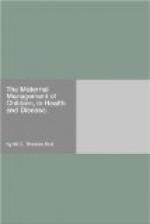By a rigid attention to these measures the mother adopts the surest antidote, indirectly, to overcome the constitutional predisposition to that disease, the seeds of which, if not inherited from the parent, are but too frequently developed in the infant during the period of nursing; and, at the same time, she takes the best means to engender a sound and healthy constitution in her child. This, surely, is worth any sacrifice.
If the infant derives the disposition to a strumous constitution entirely from the father, and the mother’s health be unexceptionable, then I would strongly advise her to suckle her own child.
The mother of A highly susceptible nervous temperament ought not.—There are other women who ought never to become nurses. The mother of a highly nervous temperament, who is alarmed at any accidental change she may happen to notice in her infant’s countenance, who is excited and agitated by the ordinary occurrences of the day; such a parent will do her offspring more harm than good by attempting to suckle it. Her milk will be totally unfit for its nourishment: at one time it will be deficient in quantity, at another, so depraved in its quality, that serious disturbance to the infant’s health, will ensue. The young and inexperienced mother, who is a parent for the first time, and altogether ignorant of the duties of her office, and at the same time most anxious to fulfil them faithfully, is but too frequently an instance in point; although at a future period she will generally make a good nurse. The following is an illustration:—
In December, 1838, I attended a young married lady in her first confinement, and in excellent health. She gave birth to a fine, plump, healthy boy. Every thing went on well for three weeks, the mother having an abundant supply of milk, and the infant evidently thriving upon it. About this time, however, the child had frequent fits of crying; the bowels became obstinately costive;—the motions being lumpy, of a mixed colour, quite dry, and passed with great pain. It became rapidly thin, and after a while its flesh so wasted, and became so flabby, that it might be said literally to hang on the bones. The fits of crying now increased in frequency and violence, coming on every time after the little one left the breast, when it would commence screaming violently, beat the air with its hands and feet, and nothing that was done could appease it. Having lasted for half an hour or more, it would fall asleep quite exhausted; the fit recurring again, when again it had been to the breast.
It was very evident that the infant’s hunger was not satisfied, as it was also but too evident its body was not nourished by the parent’s milk, which, although abundant in quantity (the breast being large and full of milk), was at this time seriously deteriorated in its nutritive quality. This was caused, I believe, from great anxiety of mind. Her nurse became suddenly deranged, and the whole responsibility and care of the child thus devolved upon the mother, of the duties connected with which she was entirely ignorant.




